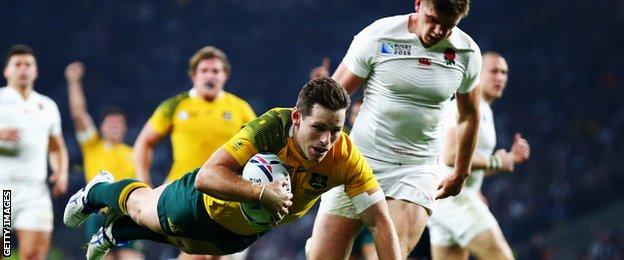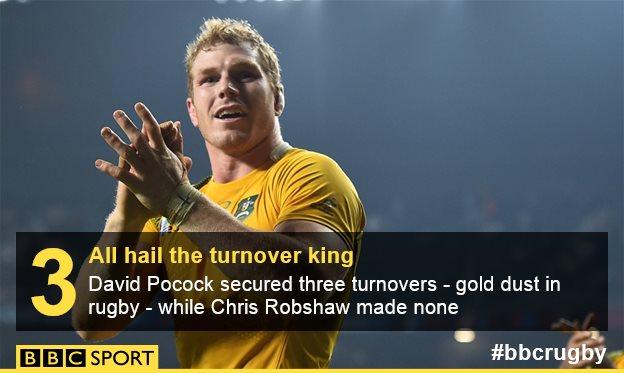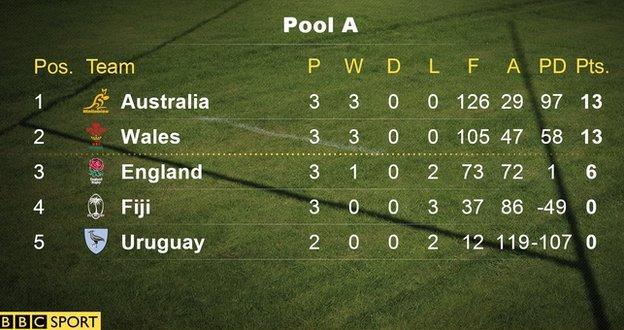A new rock bottom for England after Rugby World Cup exit?

Last updated on .From the section Rugby Union
| Rugby World Cup |
|---|
| Hosts: England Dates: 18 September-31 October |
| Coverage: Live on BBC Radio 5 live and sports extra, BBC local radio, plus live text commentary on every match on the BBC Sport website. |
| Further coverage: BBC Radio Wales, BBC Radio Cymru, BBC Radio Scotland, BBC Radio Ulster and BBC Local Radio. |
After all the hype and the hope, it wasn't even close.
World Cup humiliations are nothing new for English sporting teams. The men's football, cricket and rugby sides have now gone out of the group stages at three different World Cups in three different continents in 17 months.
But each one brings its own horrors and humiliations, and Saturday night's evisceration by Australia in south-west London will haunt those who care just as long as those performed by Uruguay in Sao Paulo or Bangladesh in Adelaide.
Stuart Lancaster promised to transform the atmosphere at Twickenham. As Matt Giteau ran in the Wallabies' third try in the 79th minute he was proved correct: a stadium of 80,000 reduced to silence, a demographic of the polite and patriotic turned into the angry and dissenting.
The Group of Death was always going to kill someone off. It may yet prove as terminal to Lancaster's coaching regime as to England's World Cup.
Alone on the pitch before the start as his players warmed up, arms folded defensively as he watched on and wondered, by the end he was being jeered by some in the crowd and ignored by others - a cruel degradation for a decent man, a miserable way for four years of optimism, planning and dedication to come crashing down around him.
A vast gulf
England and Australia were locked at 12 wins apiece since the game turned pro in 1995 going into Saturday night's 26th meeting. By 10pm there was a vast gulf between them: not just the 20-point winning margin, although that was a record defeat to this nation at this stadium, but in every area of the pitch.
In the build-up to this match Lancaster's jettisoned maverick Danny Cipriani had claimed that no Australian player would make a composite XV, a display of loyalty both startling and misjudged.
In the aftermath it was hard to think of an England player who would get in instead. Anthony Watson? It almost ends there. Nowhere was there parity, not at the breakdown, not in attacking verve, not in defence.
The scrum was supposed to be England's rock. It has proved the foundation for at least four big wins over the same opposition in the last decade. On Saturday it was just another weakness. Five times England conceded scrum penalties. They were shoved, splintered and substituted.
Regret for what might have been

The regret for those white-shirted supporters who streamed silently away into the dark streets comes from what could have been - not so much for this England side, which has decelerated into this tournament and buckled under the weight of home support just as British athletes flourished at London 2012, but for what the country could have enjoyed had they instead thrived.
Every match on a Saturday evening, everyone on terrestrial television. A celebration for the converted, a beautiful baptism for the dabblers, a journey and adventure for all of them.
The anger comes from the fact that so many saw this coming from so far away.
An academic had calculated before the match that an English exit would wipe £3bn off the stockmarket, which goes to show that the stockmarket can't be as alert to trends and forecasting as it thinks it is.
It had been muted on the trains to this part of London and nervous on the cold concrete concourses for good reason. The selection, the tactics, the captain, the balance. None of these problems had been addressed. Most had got worse as the critical battles approached.
Too slow in thought and deed

The flaws opened up from the start on Saturday night. Australia could have crossed the try-line twice in the first 10 minutes. When they did, Bernard Foley slicing through with a pace and elan that England could not match, it was entirely deserved.
Nowhere was the gulf between the two sides more glaring than at the breakdown. The Wallabies had picked two of the best open-sides in the world, David Pocock and Michael Hooper. They did exactly what most expected: stole English ball, slowed up the rest until England were running through quicksand.
The accepted portmanteau of the two men is Pooper, which is entirely appropriate for the effect they had on England's party.
Pocock, outstanding at the last World Cup, back from two major reconstructions since, nominally the number eight but seemingly everywhere at every point, made nine tackles, six carries and 14 metres, four passes, two offloads and three turnovers.
Chris Robshaw, England's skipper and the man with primary responsibility to take on those two? Six tackles, five carries, three metres, two passes, no turnovers.

A new rock bottom?
Robshaw was in pieces afterwards, as shocked by what had happened as Lancaster alongside him. But even the sympathetic will see him as the embodiment of his team: industrious, committed, loyal and pleasant, yet lacking enough of the on-field attributes that define the very best in his position.
Four years ago England went out of the World Cup to France in the quarter-finals. That was supposed to be rock bottom, the team out of control off the pitch and a mess on it.
It was the year zero from which Lancaster would rebuild the team - not only never again, but never in the same way.
Instead, for all the emphasis placed on the culture of the side, on rebuilding the relationship between the elite and those who support them, on bringing back respect for the shirt and pride in performance, his team have fallen shorter still.
The score takes care of itself, Lancaster has always said, borrowing from the title of his favourite motivational book. Get it right off the field and all else follows.
As you looked around the pitch on Saturday night - at his 18th combination of fly-half and centres in four years, at a captain striving but struggling, at a side lacking a defining style or the experience to cope - you saw the alternative argument being played out in the starkest fashion.
In the end, the hard currency of sport is a simpler one. Winning is what matters. Lancaster's England side fell well short on the biggest stage of all.

| More from rugby: |
|---|
| Get World Cup alerts direct to your phone |
| Rugby World Cup 2015 fixtures and groups |
| For the latest rugby union news, follow @bbcrugbyunion on Twitter |